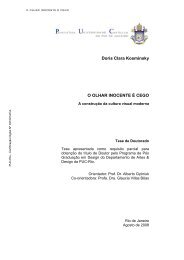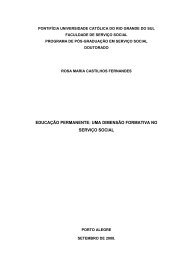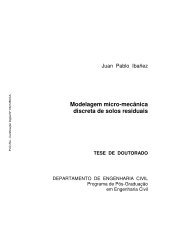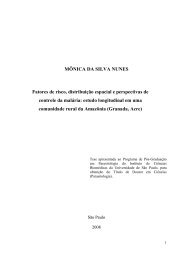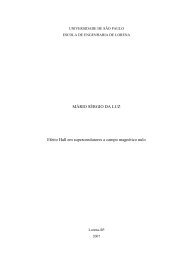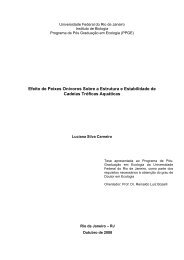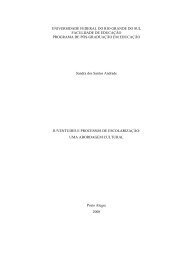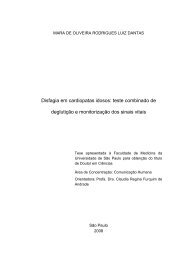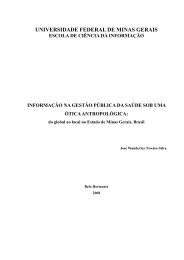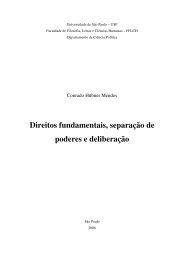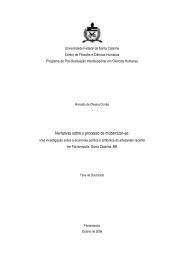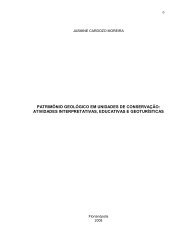Create successful ePaper yourself
Turn your PDF publications into a flip-book with our unique Google optimized e-Paper software.
IMMUNOLOGYORIGINAL ARTICLEOnset of promiscuous <strong>gene</strong> expression in murine fetal thymusorgan cultureRenato Sousa Car<strong>do</strong>so, 1 * DanielleA. R. Magalhães, 1 * Ana Maria T.Baião, 1 * Cristina Moraes Junta, 1Claudia Mace<strong>do</strong>, 1 Márcia M. C.Marques, 1 Elza Tiemi Sakamoto-Hojo, 2,3 Eduar<strong>do</strong> A. Donadi 4 andGeral<strong>do</strong> A. S. Passos 1,51 Molecular Immuno<strong>gene</strong>tics Group, Departmentof Genetics, Faculty of Medicine,2 Laboratory of Cyto<strong>gene</strong>tics and Muta<strong>gene</strong>sisDepartment of Genetics, Faculty of Medicine,3 Department of Biology (FFCLRP), 4 Departmentof Medicine, Faculty of Medicine, and5 Discipline of Genetics (DMEF), Faculty ofDentistry, University of São Paulo, RibeirãoPreto, SP, Brazil<strong>do</strong>i:10.1111/j.1365-2567.2006.02441.xReceived 4 January 2006; revised 27 June2006; accepted 28 June 2006.*These authors contributed equally to thiswork.Correspondence: Dr Geral<strong>do</strong> A. S. Passos,Molecular Immuno<strong>gene</strong>tics Group,Department of Genetics, Faculty of Medicine,14040–900, Ribeirão Preto, SP, Brazil.Email: passos@rge.fmrp.usp.brSenior author: Dr Geral<strong>do</strong> A. S. PassosSummaryT-cell differentiation and induction of tolerance to self-antigens occursmainly in the thymus. Thymic stromal cells, specifically medullary thymicepithelial cells, express a diverse set of <strong>gene</strong>s encoding parenchymalorgan-specific proteins. This phenomenon has been termed promiscuous<strong>gene</strong> expression (PGE) and has been implicated in preventing organspecificautoimmunity by inducing T-cell tolerance to self antigens. Earlythymopoiesis and the critical factors involved in T-cell differentiation canbe reproduced in vitro by murine fetal thymus organ culture (FTOC),which mimics the natural thymic microenvironment. To evaluate theoccurrence of PGE in FTOC, <strong>gene</strong> expression profiling during in vitro thymicdevelopment in BALB/c mice was performed using a set of nyloncDNA microarrays containing 9216 sequences. The statistical analysis ofthe microarray data (SAM program) revealed the temporal repression andinduction of 57 parenchymal and seven lymphoid organ-specific <strong>gene</strong>s. Mostof the <strong>gene</strong>s analysed are repressed during early thymic development (15–17 days post-coitum). The expression of the autoimmune regulator (<strong>AIRE</strong>)<strong>gene</strong> at 16 days post-coitum marks the onset of PGE. This precedes the inductionof parenchymal organ <strong>gene</strong>s during the late developmental phase at20 days post-coitum. The mechanism of T-cell tolerance induction begins duringfetal development and continues into adulthood. Our findings are significantbecause they show a fine demarcation of PGE onset, which plays acentral role in induction of T-cell tolerance.Keywords: cDNA microarray; fetal thymus organ culture; promiscuous<strong>gene</strong> expression; thymus; T-cell toleranceIntroductionThe thymus is the key primary lymphoid organ that ismainly involved in the progressive differentiation ofthymocytes to mature T cells in which all developmentalstages are distinguishable by their expression of a combinationof clusters of differentiation (CD) cell-surfacemarkers. Studies with freshly obtained fetal thymusallowed for the demarcation of T-cell receptor b V(D)Jrecombination during in vivo thymus ontogeny amongdifferent inbred mouse strains; this contributed to therevealing of the effect of the <strong>gene</strong>tic background on T-celldevelopment. 1–3 The control of <strong>gene</strong> expression duringthe development of this organ has gained priority amongseveral research groups, including our own, leading to theidentification of candidate <strong>gene</strong>s involved in thymopoiesis.Using the cDNA microarray method, a <strong>do</strong>zenexpressed sequence tags have been found that are modulatedduring the in vivo development of the thymus. 4Using the same kind of analysis, the in vivo modulationof several cell-signalling <strong>gene</strong>s was identified, includingthose of the calcium cascade pathway, which is importantfor individual stages of T-cell maturation and the controlof anergy during murine thymus ontogeny. 5Meanwhile, a better understanding of the central tolerancemechanism, that is, all the mechanisms by which Tcells contribute to self-tolerance by intrathymic recognitionof self-antigens, emerged from evidence thatÓ 2006 Blackwell Publishing Ltd, Immunology, 119, 369–375 369



